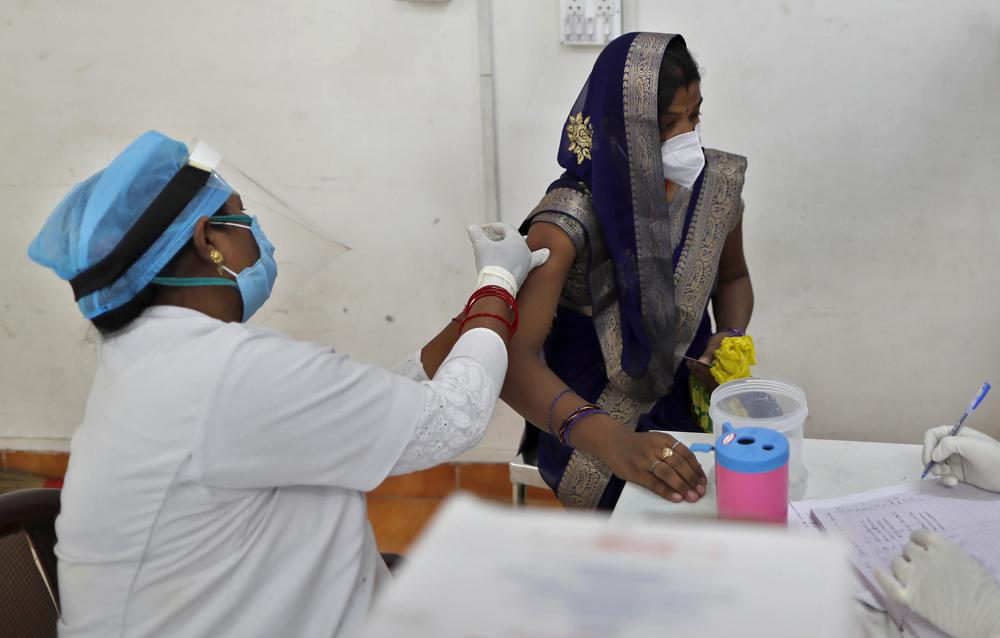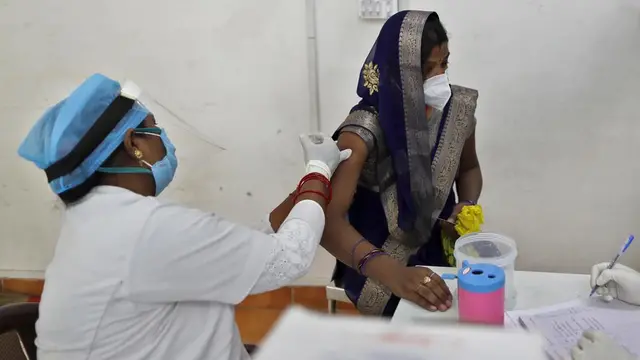
A woman receives the AstraZeneca vaccine for COVID-19 at a hospital in Prayagraj, India, May 1, 2021. /AP
A forum of scientific advisers set up by the Indian government has told authorities about minor mutations in some samples of the coronavirus that could "possibly evade immune response" and require more study, a leader of the forum has told Reuters.
However the advisers said while they were flagging the mutations, there was no reason currently to believe they were expanding or could be dangerous.
India reported more than 400,000 new COVID-19 cases for the first time on Saturday. The rampaging infections have collapsed its health system in places including capital New Delhi, with shortages of medical oxygen and hospital beds.
Scientists are studying what led to the current surge in cases in India and particularly whether a variant first detected in the country, called B.1.617, is to blame. The World Health Organization said on Tuesday that its early modelling, based on genome sequencing, suggested that B.1.617 had a higher growth rate than other variants circulating in India.
The forum of advisers, known as the Indian SARS-CoV-2 Genetics Consortium, or INSACOG, has now found more mutations in the coronavirus that it thinks need to be tracked closely.
"We are seeing some mutation coming up in some samples that could possibly evade immune responses," said Shahid Jameel, chair of the scientific advisory group of INSACOG and a top Indian virologist. He did not say if the mutations have been seen in the Indian variant or any other strain.
In hopes of taming a monstrous spike in COVID-19 infections, India opened vaccinations to all adults Saturday, launching a huge inoculation effort that was sure to tax the limits of the federal government.
However, the effort has been lagged by the shortage of vaccine supply. India, the world's largest vaccines manufacturing country, is still facing an insufficient stock, and delayed rollout. And even in places where the shots were in stock, the country's wide economic disparities made access to the vaccine inconsistent.
Only about 150 million shots have been given, equivalent to 11.5 percent of India's 1.3 billion people.
The country's shortage of shots has global implications because, in addition to its own inoculation efforts, India has promised to ship vaccines abroad as part of a United Nations vaccine-sharing program that is dependent on its supply.
Indian vaccine makers produce an estimated 70 million doses each month of the two approved shots — the AstraZeneca vaccine made by the Serum Institute of India and another one made by Bharat Biotech.
The federal government is buying half of those vaccines to give to states. The remaining half can then be bought by states and private hospitals to be given to anyone over 18, but at prices set by the companies, which can be four times the price paid by EU.
"The urgent demand for vaccines in India is bad for the rest of the world," said Ravi Gupta, a professor of clinical microbiology at Cambridge University. "It is better globally to immunize all the (vulnerable) people that need to be protected rather than to immunize entire populations in only some countries."
(With input from agencies)
 简体中文
简体中文

